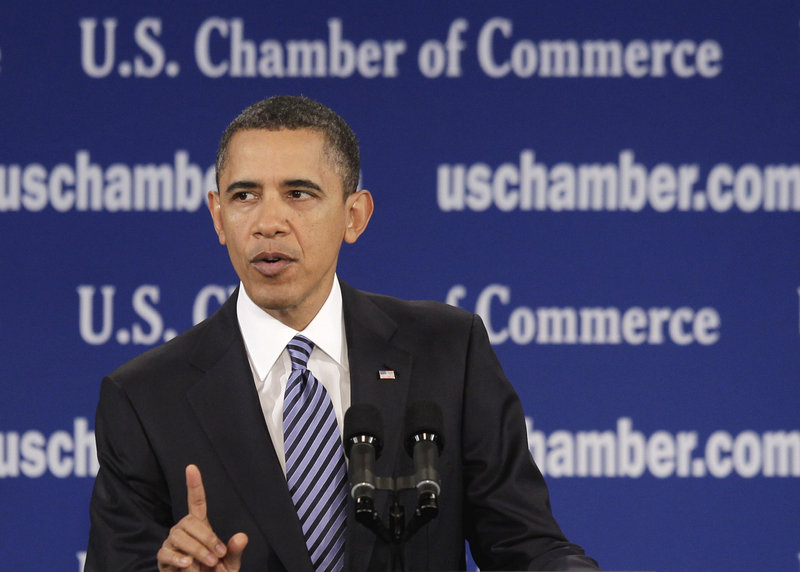WASHINGTON — In his most overt effort yet to mend ties with the nation’s business community, President Obama on Monday pledged to make government an ally to companies as they emerge from the worst economic downturn in generations.
“As a government, we will help lay the foundation for you to grow and innovate,” Obama told a crowd packed with business executives at the U.S. Chamber of Commerce.
“We will upgrade our transportation and communications networks so you can move goods and information more quickly and cheaply. We will invest in education so that you can hire the most skilled, talented workers in the world. And we’ll knock down barriers that make it harder for you to compete — from the tax code to the regulatory system.”
But even as he vowed to push hard on initiatives from trade deals to corporate tax reform, Obama challenged the business leaders to ramp up their hiring, to bring jobs back from overseas and to quit sitting on such large stockpiles of cash.
“Many of your own economists and salespeople are now forecasting a healthy increase in demand. So I want to encourage you to get in the game,” Obama said, noting the tax credits the administration recently negotiated to spur new investments. “As you all know, it is investments made now that will pay off as the economy rebounds. And as you hire, you know that more Americans working means more sales, greater demand and higher profits for your companies.
“We can create a virtuous cycle.”
The president also defended his health care law and urged the business community to refrain from challenging regulations.
“Not every regulation is bad; not every regulation is burdensome on business,” he said. “Moreover, the perils of too much regulation are matched by the dangers of too little.”
Obama made the short walk from the White House across Lafayette Park for the much- anticipated speech to the chamber, which has hosted nearly every president during the past century.
The visit, months in the making, came as the administration and the chamber — one of the nation’s most powerful lobbying groups — have tried to thaw their often-chilly connection.
Both have reasons to seek common ground.
The White House is eager to improve relations with centrist voters, corporate donors and the new Republican House majority ahead of the 2012 presidential election.
The chamber stands to benefit if it can work in a bipartisan way on initiatives it sees as beneficial to the nation’s businesses.
The relationship between the chamber and the current White House has been a turbulent one over the past two years.
The chamber spent tens of millions of dollars fighting Obama’s signature health care overhaul, opposing key elements of the financial regulation law and helping to deliver the House majority to the Republicans last fall.
In turn, Obama recently said the group may have used foreign money to fund ads attacking Democrats – an assertion the group denied – and a senior aide called the chamber’s political tactics a “threat to our democracy.”
Early in his speech, Obama joked about the tensions between the two sides.
“I’m here in the interest of being more neighborly,” he said. “Maybe we would have gotten off on a better foot if I had brought over a fruitcake when we first moved in.”
Since his party’s defeat in the November congressional elections, Obama has undertaken an ongoing effort to build bridges with the nation’s business community:
• He appointed former chamber board member and JPMorgan Chase executive William Daley as his new chief of staff.
• That appointment came on the heels of a tax deal with Republicans in which Democrats agreed to extend for two years the George W. Bush-era cuts for every income level, including the wealthiest Americans.
• Last month, Obama also ordered a broad review of environmental, health and safety regulations to weed out those that might hinder job creation, a move that won praise from chamber officials.
• The new director of Obama’s National Economic Council, Gene Sperling, made a point of visiting the chamber last month for lunch with Thomas Donohue, the organization’s outspoken president.
• Obama recently named Jeffrey Immelt, General Electric’s chief executive, to lead a new economic advisory panel focused on job creation, another signal that he intends to work with the corporate world on issues.
• Administration officials are closely coordinating with the chamber on a lobbying strategy for winning congressional support for the South Korean trade agreement.
The effort will include orchestrated events in the home states and districts of undecided lawmakers.
Chamber officials, too, have tempered some of their earlier criticism of the president.
In a speech last month, Donohue insisted that the group’s disagreements with the administration have “never been personal.”
He took note of the “new tone” at the White House and praised the appointment of Daley, even as he vowed to continue fighting against regulations the chamber views as excessive and burdensome to businesses.
On Monday, they gave the president a warm welcome. Donohue opened the event by expressing the chamber’s “absolute commitment” to working with the White House on turning around the economy and creating new jobs.
“Our focus is finding common ground to ensure America’s greatness in the 21st century,” he said. “America works best when we work together.”
Send questions/comments to the editors.



Success. Please wait for the page to reload. If the page does not reload within 5 seconds, please refresh the page.
Enter your email and password to access comments.
Hi, to comment on stories you must . This profile is in addition to your subscription and website login.
Already have a commenting profile? .
Invalid username/password.
Please check your email to confirm and complete your registration.
Only subscribers are eligible to post comments. Please subscribe or login first for digital access. Here’s why.
Use the form below to reset your password. When you've submitted your account email, we will send an email with a reset code.